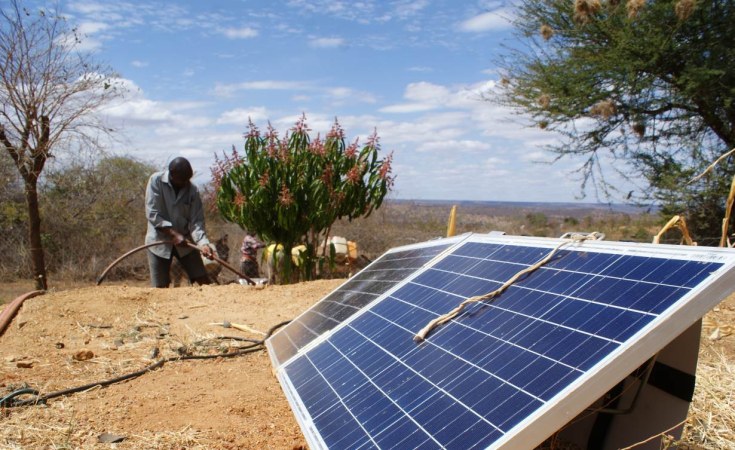With a prolonged drought affecting the supply of hydroelectricity all over southern Africa, a growing number of people are turning to solar to fill the energy gap.
"We can spend up to 44 hours with power," Kelly Huckaby tells RFI from the outskirts of Lusaka.
Originally from the United States, he has been based in Zambia since 2010 and runs a Christian ministry that hosts camps and conferences for up to 200 children at a time.
A reliable supply of electricity is essential. But the drought that has gripped southern Africa since early this year has led to rolling cuts in a country that relies heavily on hydropower.
For Huckaby, solar is proving the best alternative.
"We have just ordered solar fans, which can provide relief from the heat and also a little light and allow us to charge phones," he says.
Not only has he decided to invest in the devices for his own centre, he wants to offer solar lamps and fans to all his employees for Christmas.
Dams run dry
Zambia is going through one of its worst droughts in decades.
The country declared a national disaster in February, and has since been scaling back energy supply and trying to import electricity from neighbouring countries.
Hydroelectric dams normally provide more than 80 percent of the country's power, but lie nearly empty after months of dry weather.
The gigantic Kariba Dam on the Zambezi river, Zambia's largest source of hydroelectricity, has only 10 percent of water available for power generation, according to the Energy Ministry. The power plant it feeds will likely shut down within weeks.
"This year there's been very little rain in the central and southern parts of the country," John Keane, CEO of the UK-based charity SolarAid, told RFI from Lusaka.
"But in the north of the country, there's been more rain than usual, with flooding. There's two stark realities: Lake Tanganyika in the north is reportedly at its highest levels since 1964, and in the south, where the Kariba Dam is, that's extremely low levels."
Turning to alternatives
For months now Zambians have been forced to get used to lengthy blackouts, and more are on the way.
Last week the government warned that 14-hour power cuts introduced in July would be extended to 17 hours a day from September, with no end date in sight.
"Energy in particular is an obstacle to everyday life," said one Lusaka resident who preferred not to be named.
Like others, she has sought ways to adjust to what has become a "new normal".
"In my household we are using alternative sources of energy, i.e. the solar lamps and gas for cooking," she told RFI. "My family in particular, we're relying a lot on solar energy."
She's not alone. According to SunnyMoney Zambia, a social enterprise owned by SolarAid that sells solar lighting in rural communities, sales have increased by more than 540 percent since the beginning of 2024.
"We ordered new containers of lights produced in China" to try to match demand, said SunnyMoney country manager Karla Kanyanga, "as well as a set of solar fans, as temperatures keep on rising".
Solar's potential
Solar advocates hope the trend makes the start of a long-term shift.
"We've been campaigning in schools to educate people about solar power for years," Kanyanga told RFI. "The goal was to promote the use of solar lights in homes, schools and clinics, especially to replace charcoal, gas and candles."
Now the drought has highlighted the potential of decentralised energy sources like solar, especially in remote areas.
"In Zambia and much of sub-Saharan Africa, especially the rural areas, only a very small percentage of the population have access to electricity - we're talking between two, three, four percent," said SolarAid's Keane.
"People are then living in houses without light, without any of the modern electrical appliances that we have grown up with. And that actually makes life pretty difficult."
As the cost of solar panels drops and battery technology improves, organisations like his say solar is an increasingly affordable and reliable way to switch those households on.
Anglophone Cameroon's Solar Mamas light the way for rural farmers
Scaling up
Zambia currently has two solar power stations in operation, built by French and Italian investors, and has signed an agreement with the United Arab Emirates to develop further large-scale projects.
The country has long depended on hydroelectricity, mostly produced by a single state-owned company.
Changing weather patterns and extreme events like this year's drought have exposed how vulnerable it is to shortfall.
Lack of a steady power supply hinders both the economy and food production.
The International Monetary Fund in June revised its projected growth for Zambia's economy this year downward from 4.7 percent to 2.3 percent because of the drought.
Meanwhile the UN's World Food Programme has warned that the region-wide drought has worsened food insecurity across the whole of southern Africa.
The next rainy season would normally begin around November, but climate change makes it more difficult to predict the seasons.
Africa's nuclear dreams a fusion of high hopes and high hurdles


